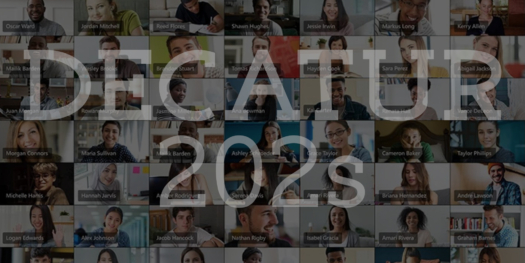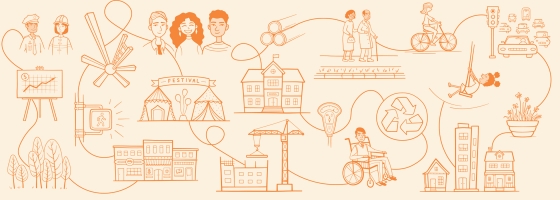Take a bow, Decatur.
Despite the challenges of a global pandemic and the limitations on in-person meetings that the crisis requires, hundreds of residents have kept the conversation going, setting the stage for the next phase of our Strategic Plan process. Here’s where we are in that process:
On Thursday, November 19, from 4 to 5:30 p.m., everyone’s invited to the first of four virtual sessions designed to narrow in on priorities for the Plan. We’re calling these sessions Decatur 202s, since they’re part info sharing and part community discussion. The topic for the first 202: Mobility, covering the full range of transportation issues, from transit to walking, biking, automobiles, and parking.
Register now to join by Zoom for the November 19th session. After Mobility comes similar discussions around Housing on December 10th, Equity and Racial Justice on January 14th, and Climate Change on a date thereafter to be determined.

Topics for the 202s were informed through a series of intensive community collaborations that launched on January 23, 2020. That’s when we kicked off the Citizen Roundtables to identify issues and questions important to residents. In March, before the three planned Roundtable sessions could be completed by in-person meetings, the pandemic forced a pause to reorganize. Zoom meetings to wrap the Roundtables finished in October. Then, to make sure anyone who wanted to add their thoughts to the process had that opportunity, we added an extra step – the Virtual Forums – which provides an online place to post new comments and refine ideas emerging from the Roundtables.
Now, as we head into the 202s and toward an initial draft of the 2030 Strategic Plan, is this: What does success over the next decade look like in a community of 25,000 in a metro area of six million?
With the Roundtables and Virtual Forums, we’ve identified a range of potential priorities under the four topic areas for the 202s. The process was also designed to allow competing priorities to emerge, inspiring efforts to resolve conflicts and to build support for effective decision-making. Take, for instance, reality checks for the upcoming Mobility topic:
Street space is a finite commodity. How do we allocate that space to serve our priorities for everyone — old or young, with or without disability — getting around – by bike, walking, buses, private automobiles? What metrics should guide the allocation of parking in Decatur’s downtown core and what about pricing?
What’s more, our discussions so far have revealed deep linkages between issues that fall under all four of our broad 202 topics. If household transportation budgets are reduced, families have more money to offset rising housing costs. Fewer greenhouse gas emissions from fossil fuel-dependent transportation boost strategies to address climate change. Historic racial inequities inhibit the wealth building that helps families address housing and transportation challenges and makes them more vulnerable to stresses related to climate change.
We can expect presentations and discussions in the 202s to identify those interconnections and to explore solutions that might leverage interdependencies instead of allowing them to exacerbate problems. We’ll work through all that together.
Watch this space for updates.

